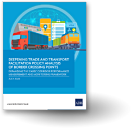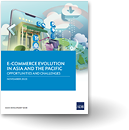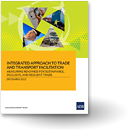Spotlight Archives
- Dealing with the “Noodle Bowl” of Asia’s Free Trade Agreements24 April 2012Masahiro Kawai and Ganeshan Wignaraja discuss the impact of Asia’s "noodle bowl"of Free Trade Agreements (FTA) on businesses based on firm-level surveys in seven countries. Read more.
- Asian Development Outlook 2012: Confronting Rising Inequality in Asia2012ADB’s flagship economic publication, the Asian Development Outlook 2012 forecasts GDP growth in developing Asia to moderate to 6.9% in 2012, before picking up to 7.3% in 2013. The greatest risk to outlook is the uncertainty surrounding the resolution of sovereign debt problems in the eurozone. Download.
- ASEAN+3 Bond Market Guide2012The ASEAN+3 Bond Market Guide is a comprehensive report on bond market in the ASEAN+3 region. The Guide is a product of the collaborative efforts of ASEAN+3 Bond Market Forum (ABMF) members and is the first report endorsed by ASEAN+3. Download.
- ADB Working Paper Series on Regional Economic Integration No. 96: Why Do Imports Fall More than Exports Especially During Crises? Evidence from Selected Asian EconomiesApril 2012H. Chink Tang examines this question by estimating a standard import demand equation augmented with differential and time-varying components of the aggregate demand and finds that falls in imports are largely but not solely due to falling exports alone. Read More. View other working papers.
- ADB Working Paper Series on Regional Economic Integration No. 95: Measuring Commodity-Level Trade Costs in Asia - The Basis for Effective Trade Facilitation Policies in the RegionApril 2012In this paper, Hamanaka and Domingo suggest that the use of trade statistics in conjunction with the World Bank’s Doing Business Report’s trade cost data is helpful in designing sector-specific trade facilitation policies. Read More. View other working papers.
- Organized by the Asian Development Bank and Kunming Municipal Government, Yunnan Province, People's Republic of China26-27 March 2012The Kunming conference brought together for the first time officials representing all ADB developing member countries integrally involved in regional cooperation and integration initiatives to share best practices and future challenges. Download proceedings.
- ADB Working Paper Series on Regional Economic Integration No. 94 - Strengthening the Financial System and Mobilizing Savings to Support More Balanced Growth in ASEAN+3March 2012A. Noy Siackhachanh reviews the progress that has been made under the Asian Bond Market Initiative (ABMI) to date, and proposes additional measures to further improve the region’s savings-investment imbalances. Read more. View other working papers.
- Pacific Economic Monitor March 2012This edition of the Pacific Economic Monitor discusses 2012 and 2013 GDP growth and inflation projections for ADB's Pacific developing member countries. Read more
- FTA initiatives of Asia and the Pacific now total 250 22 February 2012Free trade agreements (FTAs) continue to grow rapidly in the Asia and the Pacific region. From just 53 in 2000, there were 250 FTAs as of January 2012, according to the Asian Development Bank. About half are concluded, with 64 under negotiation and 60 under discussion. Track FTA trends.
- ADB Working Paper Series on Regional Economic Integration No. 93 - Assessing the Resilience of ASEAN Banking Systems: The Case of the PhilippinesFebruary 2012This paper uses a macroprudential perspective to assess the resilience of banking systems in Association of Southeast Asian Nations. In particular, Jose Ramon Albert and Thiam Hee Ng use a vector autoregression model to conduct a stress test on the Philippine banking system. The estimated impact of macroeconomic shocks on nonperforming loan and capital adequacy ratios of the banking system is found to be generally minimal. However, the banking system do have some vulnerability to interest rate and stock market shocks. Read more.




